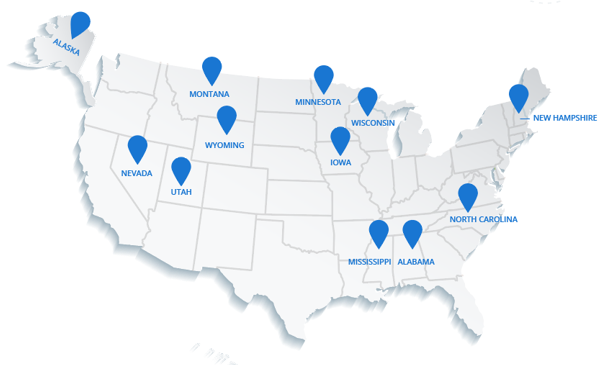There are many healthcare opportunities today in APRN roles. We explain the similarities and differences between NPs, CNSs, CNMs, and CRNAs.
In the United States today, there is a critical need for additional healthcare providers. Highly trained and skilled nurses will increasingly fulfill Advanced Practice Registered Nursing roles in areas such as adult or family practice, pediatrics, and women's health.
About Advanced Practice Registered Nurses
APRNs are registered nurses, or nurse practitioners, who have extensive clinical experience and advanced educational degrees. Nearly all hold master's degrees and in some cases, doctoratesin advanced practice nursing. They provide primary, acute and long term care, with various specializations such as pediatrics, acute care, mental health, adult or geriatric health, oncology, or community health. Though regulations vary from state to state, nurse practitioners are highly skilled professionals who generally have many responsibilities. When it comes to patient care, APRNs often handle admission histories and physicals. They order, perform, and interpret laboratory and diagnostic procedures. They also develop plans of care and treatment, prescribe medications, conduct rounds, provide education, and give support to patients and their families. In many cases, they also manage the discharge process. In addition to patient care, nurse practitioners provide education and mentoring for other members of the healthcare team. They may also be involved in quality and safety initiatives, policy development, and research.
Types of Advanced Practice Registered Nursing Roles
A list of the types of APRN roles and their descriptions follows below. All nurse practitioners must maintain current RN and NP licensures in their respective state as well as national nurse practitioner certifications.
Acute Care Nurse Practitioner (ACNP)
Nurse Practitioners in the acute care setting manage advanced care for pediatric or adult patients with complex acute or chronic health conditions. In addition to histories and physicals, diagnostics, plans of care, prescribing, and patient education, the acute care nurse practitioner is highly skilled and experienced in caring for patients in life threatening situations who need complex monitoring, intervention, and stabilization. Acute care nurse practitioners practice mainly in hospitals, emergency departments, and urgent care or trauma centers, caring for patients with the most serious and challenging health conditions or injuries. Collaborating with the healthcare team, they request consults, and initiate referrals as indicated.
Primary Care Nurse Practitioners (NP)
Nurse Practitioners in the primary care setting provide primary medical care for patients and families to include histories, assessment, diagnosis, plans of care, and treatment of routine medical conditions. The Alaska Nurse Practitioner Association describes primary care as the day-to-day health care provided by and overseen by a health care provider. Typically this provider acts as the first contact and principal point of continuing care for patients within a health care system.[note]Alaska Nurse Practitioner Association. Definition of Acute vs. Primary Care. https://anpa.enpnetwork.com/nurse-practitioner-news/60531-definition-of-acute-vs-primary-care. Published October, 2014. Accessed July 22, 2016.[/note] Depending on the location of the clinic, (hospital, physicians' clinic, school, workplace) the primary care NP provides immunizations, administers and prescribes medications, performs sick and well-child visits, and school physicals. This expert clinician requests consults, initiates referrals, and is an educator and advocate for patients and their families, as they provide day-to-day health care and education that promotes healthy lifestyles and disease prevention.
Certified Registered Nurse Anesthetists (CRNA)
Certified Registered Nurse Anesthetists are master's educated certified professionals who administer anesthetics to patients undergoing a variety of procedures in settings including hospital ORs or delivery rooms, surgical centers, physician and dentist's offices, pain management facilities, and the U.S. military. The CRNA cares for the patient throughout the entire procedure including pre-operative assessment and education, administering anesthesia, and monitoring the patient closely, adjusting dosage to ensure patient safety and comfort. They continue to monitor the patient throughout the postoperative course from recovery to the appropriate patient care department. An article in Explore Health Careers addresses the serious responsibility of the CRNA by stating As advanced practice registered nurses, they are given a high degree of autonomy and professional respect.[note]Explore Health Careers. Definition of Acute vs. Primary Care. Nurse Anesthetist. http://explorehealthcareers.org/en/Career/80/Nurse_Anesthetist. Published July 18, 2016. Accessed July 22, 2016.[/note]
Certified Nurse Midwife (CNM)
Certified Nurse Midwives are masters or doctorate level graduates of an accredited nurse midwife program. The CNM promotes traditional births for low risk pregnancies in a supportive and comfortable environment, mainly hospitals or birthing centers. These trained professionals provide individual care and support for women and their families. They are experts on promoting healthy pregnancies, educating mothers on prenatal care and birth options, preparing mothers, and setting expectations for their approaching labor and childbirth. They often provide postpartum education and support on infant child care and breastfeeding. The Certified Nurse Midwife attends the mother during labor and childbirth, constantly monitoring their patients for complications that may require the assistance of a physician. Some patients elect to continue to see the CNM for routine women's healthcare throughout their lifetimes.[note]All Nursing Schools. What You'll Do as a Nurse Midwife. http://www.allnursingschools.com/nursing-careers/nurse-midwife/job-description/. Accessed July 22, 2016.[/note]
Clinical Nurse Specialist (CNS)
Clinical Nurse Specialists are nurse practitioners who provide clinical leadership, patient care, and consultation. The CNS has many roles advanced practitioner, educator, consultant, leader, and researcher. The National Association of Clinical Nurse Specialists describes responsibilities of the CNS as providing direct patient care. The CNS improves patient outcomes through expert consultation, care coordination, monitoring quality indicators, and expert communication between the health care team and family.[note]National Association of Clinical Nurse Specialists. Advanced Practice Registered Nurses: The Clinical Nurse Specialists (CNS). http://www.nacns.org/docs/APRN-Factsheet.pdf. Published September 15, 2000. Accessed July 22, 2016.[/note]They go on to say CNSs provide expert care to patients and their families, support nurses caring for patients at the bedside, help drive practice changes throughout their organizations, and ensure the use of best practices and evidence-based care to achieve the best possible patient outcomes.[note]National Association of Clinical Nurse Specialists. Statement: Allowing Clinical Nurse Specialists to Practice to the Extent of Their Education and Training Will Improve Access to Care for our Veterans. http://www.nacns.org/docs/PR-HornerStatement160527.pdf Published May 27, 2016. Accessed July 22, 2016.[/note]Leaders and role models, CNSs provide key education and mentoring as they create an environment of continuous learning to create and implement clinical education for staff as well as education and support for patients and their families.
Neonatal Nurse Practitioners (NNPs)
Neonatal Nurse Practitioners manage the care of newborns, from healthy full-term babies to critically ill neonates born with challenging medical conditions. NNPs attend deliveries and assess, diagnose, and manage the care of newborns in the Level I, II, III or IV neonatal intensive care units depending on the condition of the baby and the level of care required. An article by GraduateNursingEDU.org says of the job description: Neonatal Nurse Practitioners serve as primary caregivers for premature or ill newborns… who may need specific, focused care due to low birth weight, respiratory distress, heart abnormalities, congenital abnormalities, and other disorders.[note]GraduateNursingEDU.org. How To Become a Neonatal Nurse Practitioner (NNP). http://www.graduatenursingedu.org/neonatal-nurse-practitioner/. Accessed July 22, 2016.[/note]The job of the NNP is stressful and requires constant upkeep on the latest technology, procedures, and instruments such as ventilators, feeding pumps, incubators, and monitors necessary to help these tiny patients survive. NNPs also provide much needed education and support for parents of these critically ill babies, as well as educational programs for NICU staff.
Which of the Advanced Practice Registered Nursing Roles is Right For You?
At DirectShifts, we focus on helping APRNs find rewarding jobs in their areas of specialty. If you'd like help finding the right position, please contact us.
This blog post was originally written by Jill Gilliland at Melnic Consulting. DirectShifts has aquired Melnic Consulting.
.png?width=50&height=50&name=Cube-Logo-150x150%20(1).png)
June 22, 2023




Comments